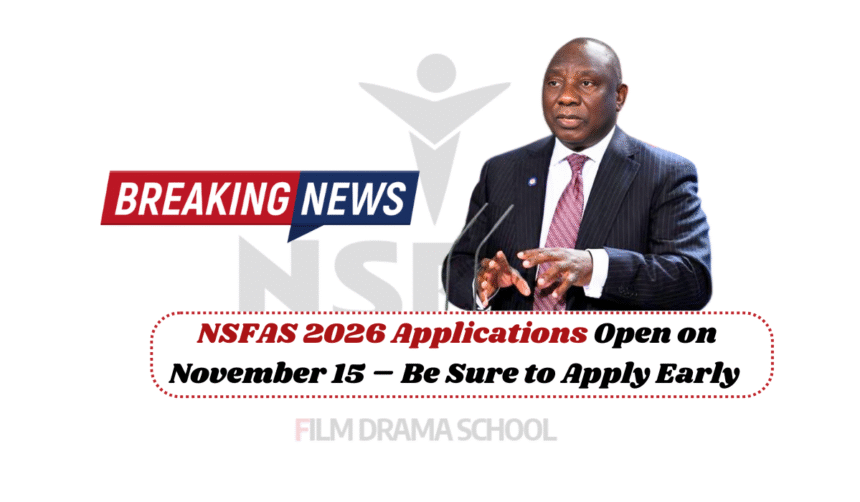NSFAS 2026 Applications Open on November 15 – Be Sure to Apply Early to Secure Funding. As the dream of higher education becomes a reality for many South African students, the NSFAS 2026 Applications are now open, offering a chance to unlock crucial financial support. Beginning on November 15, 2025, eligible students can apply for NSFAS funding to cover their tuition, accommodation, and essential living expenses for the 2026 academic year. With tuition fees continuing to rise, NSFAS remains a beacon of hope for students from low-income households, ensuring that financial constraints do not hinder access to quality education. However, with rising demand and limited funds, it’s essential to apply early and follow the right process to maximize your chances of securing the bursary.
Key Dates and Overview for NSFAS 2026 Applications
The NSFAS 2026 application cycle is both time-sensitive and competitive. Knowing the key dates and application process will help you stay ahead of the deadline and avoid unnecessary stress.
| Important Event | Date/Status |
|---|---|
| Applications Open | November 15, 2025 |
| Applications Close | To Be Announced (Usually January/February) |
| Funding Decision | After Application Review |
| Appeals Period | Post-Decision |
| Registration Deadline | Set by Institutions |
| Disbursement of Funds | After Registration |
| Appeals Outcome | Within 30 Days |
| Academic Year Start | Early 2026 |
Who Qualifies for NSFAS in 2026? Eligibility Explained
To qualify for NSFAS in 2026, applicants must meet specific criteria. The funding is aimed at students from low-income and working-class households who are unable to afford tertiary education. Here’s a breakdown of the eligibility criteria for NSFAS 2026 applicants:
- South African citizen
- Registered or intending to register at a public university or TVET college
- Household income of R350,000 or less per year (R600,000 for disabled students)
- SASSA grant recipients automatically qualify
- Must meet academic progression requirements to remain eligible for funding.
Types of Students Who Should Apply:
- First-time university or TVET college students
- Returning NSFAS-funded students who need to reapply
- Students changing institutions or courses
- Orphaned or vulnerable children
- Students with disabilities (specific documentation required)
| Eligibility Category | Qualification Criteria | Notes |
|---|---|---|
| South African Citizen | Yes | ID required |
| Household Income | ≤R350,000/year | R600,000 if disabled |
| Academic Status | Meets institution requirements | Matric, NQF level as per course |
| Institution Type | Public universities/TVET only | Private colleges not included |
| SASSA Beneficiary | Automatic qualification | Proof required |
| Disability | R600,000 income threshold | Medical forms needed |
| Reapplicants | Funding not guaranteed | Reapply each year |
How to Apply for NSFAS 2026: Step-by-Step Guide
Applying for NSFAS may seem overwhelming, but breaking it down into simple steps can help you navigate the process smoothly. Here’s a step-by-step guide to ensure that your NSFAS 2026 application is completed correctly:
- Gather Required Documents
Prepare the following documents in advance:- Certified copy of your ID
- Proof of income (your parents/guardians or your own, if applicable)
- Academic records or Matric certificate
- Proof of residence (optional but recommended)
- Register an Account on the NSFAS Portal
- Visit the official NSFAS portal: www.nsfas.org.za
- Create a new account by filling in your personal details.
- Complete the Online Application Form
- Fill out the application form accurately with correct personal and academic information.
- Make sure all sections are completed before submitting.
- Upload Supporting Documents
- Upload the required documents in the specified format (e.g., PDF, JPG, or PNG).
- Submit Before the Deadline
- Double-check everything before submitting.
- Submit your application before the closing date to ensure consideration.
- Track Your Application Status
- Regularly monitor your NSFAS application status through the portal to check for updates.
Required Documents Checklist
Here’s a checklist of documents you will need to gather before submitting your NSFAS 2026 application:
| Document | Who Needs It | Format |
|---|---|---|
| Certified ID Copy | All applicants | PDF/JPG/PNG |
| Proof of Income | Parent/guardian/applicant | Payslip/affidavit |
| SASSA Letter | SASSA recipients | Official letter |
| Academic Records/Matric Cert | First-time/returning students | PDF/JPG/PNG |
| Disability Annexure | Students with disabilities | Medical form |
| Consent Form | Parental income disclosure | Signed PDF/JPG |
| Proof of Residence | Optional but recommended | Utility bill/letter |
NSFAS Allowances and What the Bursary Covers
NSFAS bursaries cover a wide range of expenses, ensuring that students are supported throughout their academic journey. Here’s a breakdown of what NSFAS pays for:
- Tuition fees (full cost at public universities)
- Accommodation (university or college-approved rates)
- Living allowance for food and essential needs
- Learning material allowance (books, devices)
- Transport for off-campus students
NSFAS Allowance Table 2026 (Estimates)
| Allowance Type | University Students | TVET College Students |
|---|---|---|
| Tuition | Full cost | Full cost |
| Accommodation | R48,000 max/year | R40,000 max/year |
| Transport | R7,500 max/year | R7,500 max/year |
| Living Allowance | R16,500/year | R7,000/year |
| Learning Materials | R5,200/year | R3,000/year |
| Registration | Included | Included |
| Personal Care | R3,000/year | R2,000/year |
Common Mistakes to Avoid During NSFAS Application
Here are some common mistakes that applicants should avoid to ensure their NSFAS 2026 application is successful:
- Missing the deadline
- Uploading incomplete or unclear documents
- Using wrong personal information
- Failing to track your application
- Not reading NSFAS communications/emails
How to Check Your NSFAS Application Status
After submitting your application, it’s crucial to keep track of your NSFAS application status to address any issues that may arise. Follow these steps to stay informed:
- Log in to your NSFAS account.
- Navigate to the ‘Application Status’ tab.
- Review any messages or requests for additional information.
- Respond promptly to NSFAS queries.
NSFAS Departmental Contact Details for 2026
If you need assistance, here are the official NSFAS contact details:
| Department | Contact Method | Details |
|---|---|---|
| General Enquiries | Call Centre | 08000 67327 |
| Email Support | [email protected] | |
| Application Queries | Online Contact Form | www.nsfas.org.za/contact |
| TVET Support | Dedicated Hotline | 0860 067 327 |
| Disability Support | [email protected] | |
| Appeals Department | [email protected] |
When and How to Appeal an NSFAS Decision
If your NSFAS application is rejected, you have the right to appeal the decision. Here’s how you can go about it:
- Review the reason for rejection on your NSFAS account.
- Gather any additional supporting documents if necessary.
- Submit your appeal through the NSFAS portal or via email.
- Wait for a response within 30 working days.
- Follow up if you do not receive a response in the given timeframe.
Important Reminders for NSFAS Applicants
Remember these important points during your NSFAS 2026 application process:
- The application process is free never pay anyone to apply on your behalf.
- Regularly check your email and NSFAS account for updates.
- Keep copies of all your documents.
- Ask for help early if you encounter any issues.
FAQs About NSFAS Application
How long does the NSFAS application process take?
The NSFAS application process takes several weeks. After submitting your application, it usually takes up to 30 days for the final decision, and the funds are disbursed after registration at the institution.
Can I apply for NSFAS if I am studying at a private institution?
No, NSFAS funding is only available to students at public universities and TVET colleges in South Africa. Private institutions are not covered by NSFAS.
What happens if my NSFAS application is rejected?
If your application is rejected, you can appeal the decision within the appeals period by submitting additional documentation and explaining your situation clearly.
Conclusion
In conclusion, applying for NSFAS 2026 is a vital step for South African students seeking financial support for their higher education journey. By understanding the eligibility criteria, gathering the necessary documents, and submitting your application early, you can secure essential funding for your studies. Stay informed, avoid common mistakes, and regularly track your application to ensure a smooth process. Take the first step toward your educational future with NSFAS today.



















